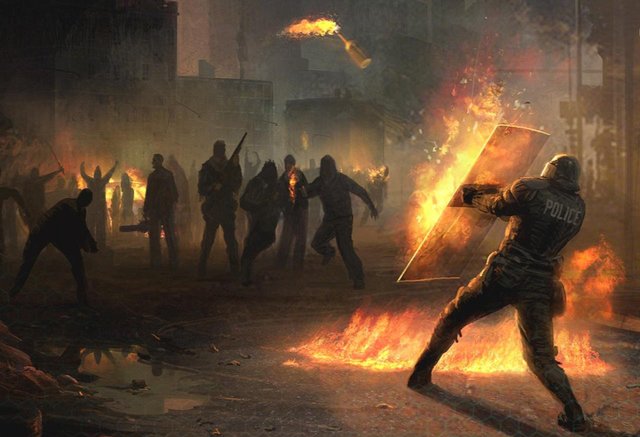Pacifism and Violence
 One cannot live as a pacifist in an organized society without the presence of a warrior class which is willing to be violent. It is, in fact, the latter group's capacity for violence which enables the former to live as pacifists.
One cannot live as a pacifist in an organized society without the presence of a warrior class which is willing to be violent. It is, in fact, the latter group's capacity for violence which enables the former to live as pacifists.
It is important that we first contrast people who are pacifists from those who are simply nonviolent. The ethics of pacifism dictate that there is never justification for violence. At its most extreme, this means that one cannot use violence in any way for any reason and a person who lives within that ethical framework must not commit a violent act even in instances of self-preservation. The reason for this is that many pacifists view a "pure death" as preferable to violating one's ethical principles and it is on this where we contrast nonviolence from pacifism.
People who are nonviolent will act violently if the situation dictates that they do so to protect themselves or others. These nonviolent actors fall within the ethical framework of the nonaggression principle (NAP) which does not strictly forbid violence. This means that you are free to act in any manner you wish so long as you do not act aggressively toward persons or properties. You may, however, justifiably use violence in self-defense or the defense of others.
Enclave of Security
In the current state system, we recognize that government entities have the monopoly on violence within their designated borders. Law enforcement officials, who otherwise keep society calm enough for pacifism to exist, have a necessarily violent occupation. Their job necessitates the use of force against a violent minority of society to ensure that the majority of nonviolent citizens may live out their lives unadulterated.
Outside of the state, in the anarchic international system, it is the military which keeps the state protected from external threats. Military service, like its law enforcement counterpart, is a necessarily violent occupation. Service members must be willing and able to use devastating violent aggression against their enemy to ensure operational success and the well being of those who they defend in their homeland.
With the military keeping foreign threats at bay and law enforcement keeping internal chaos at a minimum, then the only conclusion that can be drawn is that violence enables pacifism. Without the military and law enforcement, then violent threats would constantly be at the doorsteps of every pacifist and they would not survive. There would be no enclave of security for the pacifists to live.
Transfer of Burdens
Because the pacifists benefit from the violence of others, this may be seen as a "tacit consent" of violent action on their behalf. Those who are engaging in this violence are voluntarily assuming the burdens associated with their chosen occupation from others who would otherwise be forced to engage in the violence themselves. These burdens have adverse, measurable effects on their personal lives. They include the loss of personal freedom, physical harm, psychological trauma, emotional suffering, and relationship hardships.
There is no moral loss on the part of those who choose to not engage in violence because the transfer of burdens is performed voluntarily. One cannot be accused of forcing these burdens on to others. Nevertheless, the burdens remain as real as the necessity of the violence which causes them.
On the other hand, there is virtue assigned to those who willfully assume these burdens for others. They do not do it for their own personal benefit, but for the benefit of others whom they may never meet. In practice, the compensation for this is rarely, if ever, at least equal to the level of the personal toll.
Therefore, it is only because of the warrior class, which is willing to assume the burdens of violence, that people can choose to live their lives completely violence-free in an organized society. Without the warrior class, pacifism would not proliferate because the pacifists would either be forced to act violently at some point or die when they are confronted by an aggressor.
Response to Potential Critique
[1] It can be pointed out that one may draw the conclusion that pacifism is a farce due to the transfer of burdens which I describe. Pacifists depend upon violence and therefore are violent they simply don’t act violently themselves. This is a conclusion that I accept, but don’t include because it is the act of violence that this essay is concerned with.
Going further down the rabbit hole, some would argue that the transfer of burdens is, in fact, an act of violence against the warrior class. To this, I simply disagree based on the voluntary nature of the exchange. The warrior class commits violence so others do not have to. It is, therefore, a gift from the warrior class, hence the assigned virtue.
[2] Keep in mind that this essay is written through an idealized lens. There is a built-in assumption that the military and law enforcement are always acting within an ethical framework to punish those who act aggressively and violate the rights of others. The benefits received from the warrior class is not “at the expense” of others in society.
[3] There are no distinctions other than what was expressly stated. All others are considered equal. To repeat, the benefits do not come at the expense of others.
Reply to my last blog post everytime you make a blog post and I will upvote and resteem it for free to my 36,000+ followers. @a-0-0